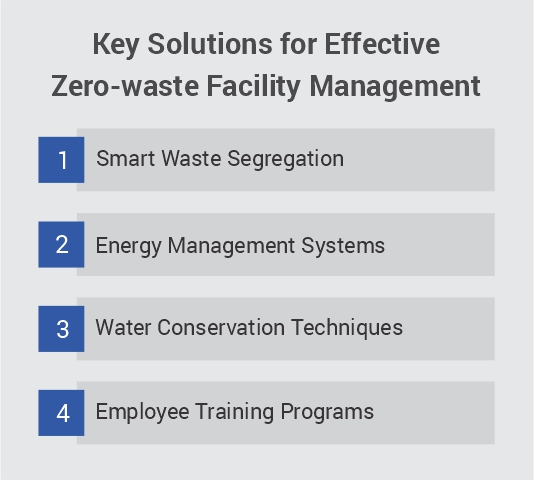As ESG principles redefine business priorities, the demand for zero-waste practices is rising across India. This blog explores how a leading facility management company in India can drive sustainability through smart innovations and Integrated Facility Management Services. Learn how facilities and management teams play a vital role in achieving ESG goals and why partnering with top facility management companies is essential to building a responsible, waste-free future.
The Growing Demand for Zero-Waste Facility Management

In the evolving landscape of corporate responsibility, Environmental, Social, and Governance (ESG) principles have become pivotal in shaping business strategies worldwide. In India, a significant shift is underway as companies increasingly prioritize zero-waste facility management to align with ESG goals. This transformation is not only enhancing environmental stewardship but also redefining the role of facility management companies in India.
Understanding ESG and Its Relevance to Facility Management
ESG encompasses three critical dimensions:
- Environmental: Focuses on reducing carbon footprints, managing waste, and conserving natural resources.
- Social: Pertains to labor practices, community engagement, and employee well-being.
- Governance: Involves corporate ethics, compliance, and transparent reporting.
Facility management companies play a crucial role in implementing ESG strategies by ensuring sustainable operations, promoting social responsibility, and maintaining ethical governance within organizations.
The Rise of Zero-Waste Facility Management in India
Zero-waste facility management aims to eliminate waste generation by promoting recycling, reusing materials, and reducing consumption. This approach aligns with ESG objectives and offers several benefits:
- Environmental Impact: Minimizes landfill usage and reduces greenhouse gas emissions.
- Economic Efficiency: Lowers waste disposal costs and enhances resource utilization.
- Social Responsibility: Encourages community involvement and supports waste management workers.
In India, the adoption of zero-waste practices is gaining momentum, driven by regulatory frameworks and increasing environmental awareness.
Innovative Facility Management Solutions Driving Sustainability
The integration of advanced technologies and innovative practices is essential for effective zero-waste facility management. Key solutions include:
- Smart Waste Segregation: Utilizing IoT-enabled bins and sensors to monitor and manage waste in real-time.
- Energy Management Systems: Implementing automated controls to optimize energy consumption and reduce carbon emissions.
- Water Conservation Techniques: Adopting rainwater harvesting and greywater recycling to minimize water usage.
- Employee Training Programs: Educating staff on sustainable practices and encouraging participation in zero-waste initiatives.
These facility management solutions not only enhance operational efficiency but also contribute significantly to achieving ESG targets.
The Role of Facilities and Management in Achieving ESG Goals
Facilities and management teams are instrumental in driving ESG compliance through:
- Policy Implementation: Developing and enforcing sustainability policies across organizational operations.
- Performance Monitoring: Tracking environmental metrics and reporting progress towards ESG objectives.
- Stakeholder Engagement: Collaborating with employees, suppliers, and communities to foster a culture of sustainability.
By aligning facilities and management strategies with ESG principles, organizations can ensure long-term sustainability and corporate responsibility.
Conclusion
The growing emphasis on ESG has propelled the demand for zero-waste facility management in India. Top facility management companies are leading this transformation by integrating sustainable practices, innovative solutions, and ethical governance into their operations. As businesses continue to prioritize ESG objectives, the role of facilities and management in achieving zero-waste goals will become increasingly vital, paving the way for a more sustainable and responsible future.
Industries we serve:
Automobile | Ancillary | Manufacturing | Pharmaceutical | Healthcare | Oil and Gas | FMCG | Education | Real Estate | Commercial
Also read: How Predictive Maintenance Improves Asset Longevity in India

